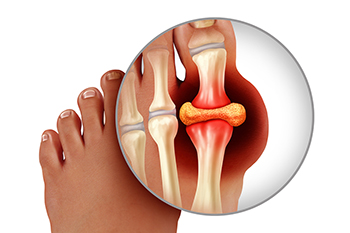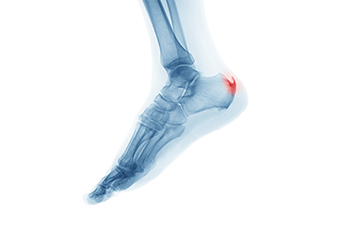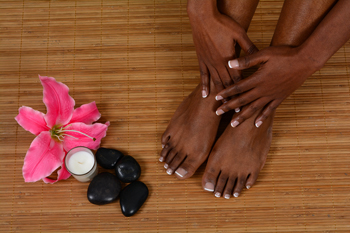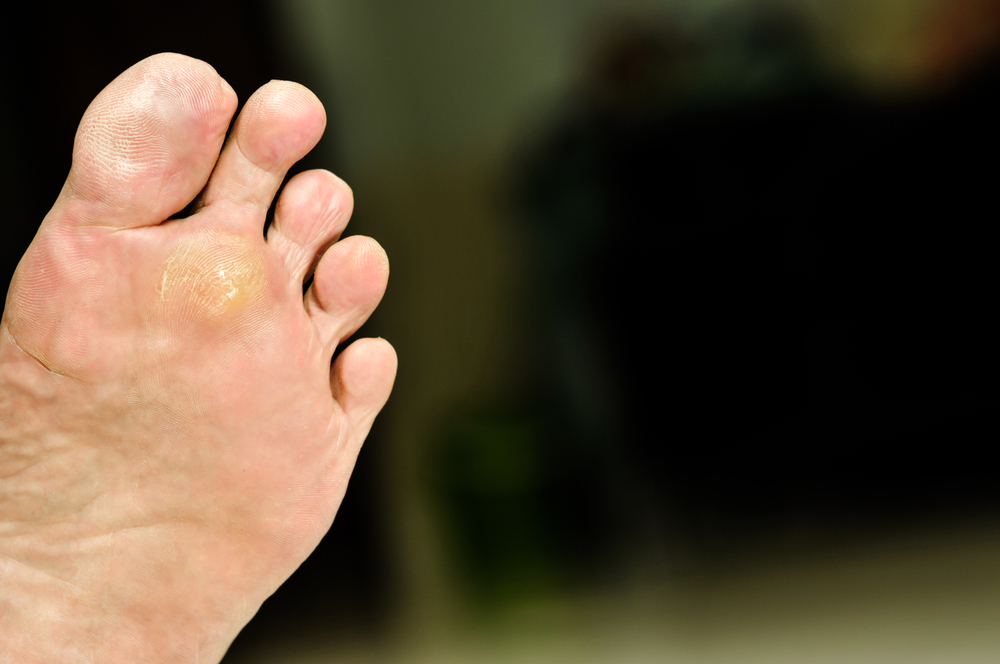Connect With Us
Blog
Items filtered by date: August 2023
Definition, Causes, and Avenues of Treatment for Gout

Gout, a complex form of arthritis, is often accompanied by intense pain and inflammation that targets the joints, including the feet. This condition results from the accumulation of uric acid crystals in the joints, leading to sudden and excruciating attacks of pain. The underlying cause is often an overproduction or inefficient excretion of uric acid, which is a waste product. Dietary factors, such as high purine foods and excessive alcohol consumption, can exacerbate gout. Managing gout involves implementing various treatment methods. Medications may help to reduce pain and inflammation during attacks, while long term strategies focus on lowering uric acid levels. This can be accomplished through lifestyle adjustments and prescribed medications. Consulting a podiatrist is paramount in tailoring an effective treatment plan. If you are afflicted with gout, it is strongly suggested that you are under the care of this type of doctor who can effectively help you to manage this condition.
Gout is a foot condition that requires certain treatment and care. If you are seeking treatment, contact Dr. David Ungar from Personal Foot Care. Our doctor will treat your foot and ankle needs.
What Is Gout?
Gout is a type of arthritis caused by a buildup of uric acid in the bloodstream. It often develops in the foot, especially the big toe area, although it can manifest in other parts of the body as well. Gout can make walking and standing very painful and is especially common in diabetics and the obese.
People typically get gout because of a poor diet. Genetic predisposition is also a factor. The children of parents who have had gout frequently have a chance of developing it themselves.
Gout can easily be identified by redness and inflammation of the big toe and the surrounding areas of the foot. Other symptoms include extreme fatigue, joint pain, and running high fevers. Sometimes corticosteroid drugs can be prescribed to treat gout, but the best way to combat this disease is to get more exercise and eat a better diet.
If you have any questions please feel free to contact our office located in Farmington, MI . We offer the newest diagnostic and treatment technologies for all your foot and ankle needs.
Causes, Symptoms, and Relief Options for Heel Spurs

Heel spurs, those tiny bony protrusions at the base of the heel, can spark significant discomfort and hinder daily activities. Heel spurs occur as a result of calcium deposits accumulating over time, often caused by strains on the foot's ligaments and muscles. Individuals who engage in repetitive activities or those with flat feet are particularly susceptible. Symptoms include sharp pain, especially while walking or when standing after rest, in addition to tenderness and inflammation. Understanding the underlying causes is pivotal for addressing heel spurs. Treatments encompass a range of approaches that can range from rest, wearing orthotic inserts to taking anti-inflammatory medications. In more severe cases, medical interventions such as surgery may be considered. With proper care and treatment, individuals can regain comfort and resume daily activities. If you have developed a heel spur, it is strongly suggested that you are under the care of a podiatrist who can effectively diagnose and treat this ailment.
Heel spurs can be incredibly painful and sometimes may make you unable to participate in physical activities. To get medical care for your heel spurs, contact Dr. David Ungar from Personal Foot Care. Our doctor will do everything possible to treat your condition.
Heels Spurs
Heel spurs are formed by calcium deposits on the back of the foot where the heel is. This can also be caused by small fragments of bone breaking off one section of the foot, attaching onto the back of the foot. Heel spurs can also be bone growth on the back of the foot and may grow in the direction of the arch of the foot.
Older individuals usually suffer from heel spurs and pain sometimes intensifies with age. One of the main condition's spurs are related to is plantar fasciitis.
Pain
The pain associated with spurs is often because of weight placed on the feet. When someone is walking, their entire weight is concentrated on the feet. Bone spurs then have the tendency to affect other bones and tissues around the foot. As the pain continues, the feet will become tender and sensitive over time.
Treatments
There are many ways to treat heel spurs. If one is suffering from heel spurs in conjunction with pain, there are several methods for healing. Medication, surgery, and herbal care are some options.
If you have any questions feel free to contact our office located in Farmington, MI . We offer the latest in diagnostic and treatment technology to meet your needs.
Essential Foot Care Tips

Your feet are vital for your overall well-being and maintaining an active lifestyle. Neglecting foot care can lead to various problems, making it essential to establish a healthy foot care routine. Proper foot care is particularly crucial for individuals with diabetes to prevent complications. To start, regularly clean, dry, and moisturize your feet. Examine them for infections and trim toenails carefully. Choose comfortable shoes that fit well and avoid wearing high heels for prolonged times. Establish a daily foot care routine, pay attention to symptoms, and seek timely treatment for common foot problems. These can include athlete's foot, nail fungus, warts, blisters, corns, calluses, and bunions. If you would like to know more about foot care essentials or are experiencing a problem with your feet, it is suggested that you make an appointment with a podiatrist to obtain expert advice for everything related to the feet and ankles.
Everyday foot care is very important to prevent infection and other foot ailments. If you need your feet checked, contact Dr. David Ungar from Personal Foot Care. Our doctor can provide the care you need to keep you pain-free and on your feet.
Everyday Foot Care
Often, people take care of their bodies, face and hair more so than they do for their feet. But the feet are a very important aspect of our bodies, and one that we should pay more attention to. Without our feet, we would not be able to perform most daily tasks.
It is best to check your feet regularly to make sure there are no new bruises or cuts that you may not have noticed before. For dry feet, moisturizer can easily be a remedy and can be applied as often as necessary to the affected areas. Wearing shoes that fit well can also help you maintain good foot health, as well as making it easier to walk and do daily activities without the stress or pain of ill-fitting shoes, high heels, or even flip flops. Wearing clean socks with closed shoes is important to ensure that sweat and bacteria do not accumulate within the shoe. Clean socks help to prevent Athlete’s foot, fungi problems, bad odors, and can absorb sweat.
If you have any questions please feel free to contact our office located in Farmington, MI . We offer the newest diagnostic and treatment technologies for all your foot and ankle needs.
Are Bunions Affecting Your Everyday Life?
Socks Help Protect the Feet From Running Injuries

Much attention is placed on finding the proper running shoes for your feet and the type of running you will be doing. However, finding the right socks can be equally important to avoid discomfort and injury while running. The right running socks can help to prevent blisters, pad the feet, offer support, and wick away moisture. Running socks have certain attributes that normal socks don’t have. First, they are seamless, which can help to eliminate the rubbing and friction that encourages the formation of blisters. Second, while wearing running socks may not be the same as having insoles, many will contain a compression band that adds support and improves the fit. Third, many running socks also include cushioning for the ball of the foot and the heel. Finally, double-layer socks absorb the friction between the layers rather than on the skin. For more help with this and other ways to prevent running injuries, it is suggested that you make an appointment with a podiatrist.
Exercising your feet regularly with the proper foot wear is a great way to prevent injuries. If you have any concerns about your feet, contact Dr. David Ungar of Personal Foot Care. Our doctor will treat your foot and ankle needs.
How to Prevent Running Injuries
Many common running injuries are caused by overuse and overtraining. When the back of the kneecap starts wearing out and starts causing pain in your knee, this is commonly referred to as runner’s knee. Runner’s knee is a decrease in strength in your quadriceps and can occur if you’re not wearing properly fitted or supporting shoes. To prevent runner’s knee, focusing on hip strengthening is a good idea, as well as strengthening your quads to keep the kneecaps aligned.
What Are Some Causes of Running Injuries?
- One cause of a common running injury is called iliotibial band syndrome.
- Plantar fasciitis is also another common injury.
- Stress fractures can occur from overtraining, lack of calcium, or even your running style.
Best Ways to Prevent Running Injuries
- Wear footwear that fits properly and suits your running needs.
- Running shoes are the only protective gear that runners have to safeguard them from injury.
- Make a training schedule. Adding strengthening exercises as well as regular stretching can help keep you strong and limber and can lessen the possibility of injuries.
- Stretching keeps muscles limber; this will help you gain better flexibility.
If you have any questions please feel free to contact our office located in Farmington, MI . We offer the newest diagnostic and treatment technologies for all your foot and ankle needs.
What Are Plantar Warts?

Plantar warts are small, rough growths on the sole of the feet caused by HPV, or the human papillomavirus, entering the skin through minor cuts or abrasions. These warts can be painful, especially when walking or standing. They may appear as single growths or in clusters. Over-the-counter treatments, like salicylic acid patches or gels, can be effective in gradually dissolving plantar warts over time. However, some cases are stubborn and necessitate professional intervention. If you or your child have a plantar wart that is painful or will not go away, it is suggested that you make an appointment with a podiatrist for treatment options that might include freezing the wart, laser therapy, or a minor surgical procedure to permanently remove it.
Plantar warts can be very uncomfortable. If you need your feet checked, contact Dr. David Ungar from Personal Foot Care. Our doctor will assist you with all of your foot and ankle needs.
About Plantar Warts
Plantar warts are the result of HPV, or human papillomavirus, getting into open wounds on the feet. They are mostly found on the heels or balls of the feet.
While plantar warts are generally harmless, those experiencing excessive pain or those suffering from diabetes or a compromised immune system require immediate medical care. Plantar warts are easily diagnosed, usually through scraping off a bit of rough skin or by getting a biopsy.
Symptoms
- Lesions on the bottom of your feet, usually rough and grainy
- Hard or thick callused spots
- Wart seeds, which are small clotted blood vessels that look like little black spots
- Pain, discomfort, or tenderness of your feet when walking or standing
Treatment
- Freezing
- Electric tool removal
- Laser Treatment
- Topical Creams (prescription only)
- Over-the-counter medications
To help prevent developing plantar warts, avoid walking barefoot over abrasive surfaces that can cause cuts or wounds for HPV to get into. Avoiding direct contact with other warts, as well as not picking or rubbing existing warts, can help prevent the further spread of plantar warts. However, if you think you have developed plantar warts, speak to your podiatrist. He or she can diagnose the warts on your feet and recommend the appropriate treatment options.
If you have any questions please feel free to contact our office located in Farmington, MI . We offer the newest diagnostic and treatment technologies for all your foot and ankle needs.

